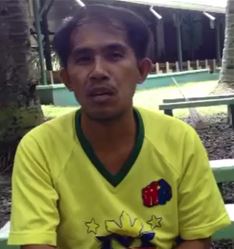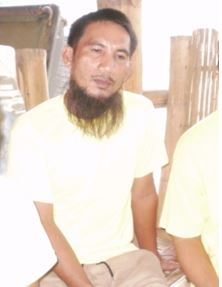
(Note: this article was first published in the August 10, 2014 issue of the Sunday Examiner)
What Fernando Obedencio and Haron Abubakar have in common is that they were both arrested in 2005 in General Santos City. Both were 25-years-old, accused on the grounds of planted evidence and both were tortured by the police to gain a confession.
Photo: Fernando Obedencio
What they don’t have in common is that they were picked up in separate incidents and, while Obedencio is now a free man, nine years later, Abubakar is still languishing behind bars waiting for another appearance in court.
But the most bizarre thing that they do not have in common is that Obedencio still has the legal identity that he had when he was arrested, while Abuakar has, through torture and falsification of court documents, legally become a person that he never was, is not now, or ever will be.
 While this may be the stuff of fiction, in The Philippines it is not surprising, as fiction is limited by the imagination, whereas reality only has the boundaries of the cruelty of law enforcement officers and the extent they will go to in order to get a conviction.
While this may be the stuff of fiction, in The Philippines it is not surprising, as fiction is limited by the imagination, whereas reality only has the boundaries of the cruelty of law enforcement officers and the extent they will go to in order to get a conviction.
Obedencio was an active human rights advocate from the Blaan tribal people in southern Mindanao when he entered prison, but when he emerged on June 23 he was a 34-year-old lost soul.
Photo: Haron Abubakar
The court held that the marijuana (cannabis) presented to the court as evidence was not the same sample that they claimed to have confiscated from Obedencio and his lawyer argued successfully that someone had planted the illegal drugs in his motorcycle and he was forced to admit they were his.
When asked how he spent his time in prison, Obedencio said in jest, “In prison, you must know how to entertain yourself; otherwise, you end up either crazy or gay!”
However, he also admitted to bad bouts of loneliness and said that he worried profoundly about his family.
While Obedencio can now look back and joke about his life in prison, Abubakar is still nursing his strong sense of injustice over what the police have done to him.
He belongs to the Maguindanaoan tribe and was a farmer. When he was arrested, he was riding a motorcycle with another man, who was about to be wed. The police stopped them at a checkpoint.
Abubakar and his companion were forced to get off their motorcycle and the police started torturing them on the street in broad daylight.
But when asked about what happened nearly nine years ago, he still has clear recall.
“They shoved me to the ground. They stepped on my face hard with their combat boots and rubbed my face in the ground. My skin peeled off. At the police camp, they extracted a confession from me and forced me to admit I was somebody else,” he said.
The person whom the police wanted Abubakar to admit to being is Ariel Bansalao. He is the person actually accused of robbing and murdering a passenger in a bus.
But he is still at large.
To justify Abubakar’s arrest, the police presented witnesses in court testifying that he was Bansalao, but the witness could not speak. He was not able to affirm or deny the police version of events.
The police totally ignored compelling documentary evidence and testimonies from people who knew Abubakar and affirmed that he was not Bansalao.
Together with the prosecution, they succeeded in amending the official court documents and were able to declare that Abubakar was Bansalao, so the trial could continue.
“They made me a different person; they gave me a new name. My real name became an alias,” Abubakar told us when we visited him in prison.
Abubakar has been tortured by the police and forced a false identity on him, concocted by amending the court documentation.
Before the law, he has actually become the person whom the police want him to admit to being.
It is outrageous that Obedencio was forced to endure nearly nine years in jail. He could have spent a productive life outside prison.
But now the question is how long will Abubakar have to spend behind bars?
In The Philippines, what Obedencio experienced in prison and what Abubakar is still enduring is no longer surprising. They are a commonplace occurrences. Perhaps, they are so common that these stories hardly evoke anger and protest anymore.
What makes it scary is not the wrongness of these cases, but how perhaps our minds have become so collectively desensitised that even the utter meaningless of this deprivation of liberty has become tolerable and acceptable.